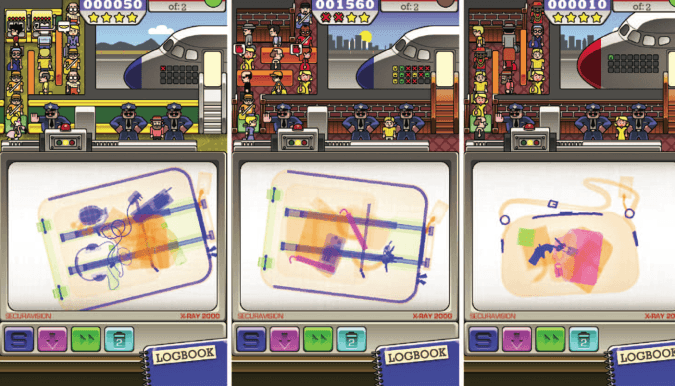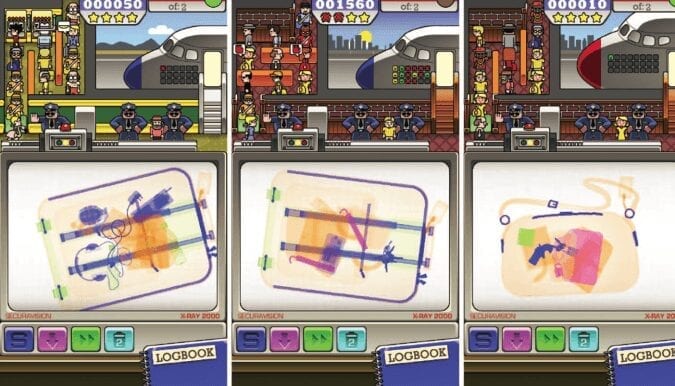
A fast-paced game app where players pretend they are baggage screening officers operating airport x-ray scanners has provided researchers with billions of pieces of data in record time, according to an article published by the American Psychological Association.
“Mobile devices offer researchers an exciting new means to crowdsource an experiment using games that are actually tests of cognition or other brain functions,” said Stephen R. Mitroff, PhD, of Duke University, lead author of the report, published in APA’s Journal of Experimental Psychology: Human Perception and Performance®. “Questions that could have taken decades to answer in a laboratory setting, or that could not be realistically answered in a lab, can be examined using big data gathered in a relatively short time.”
To demonstrate the potential of mobile technology to gather data, the researchers partnered with Kedlin Co., the developer of the popular mobile app game Airport Scanner, which challenges players to identify illegal items in luggage passing through an airport x-ray scanner. Players view one bag at a time and tap their touchscreen to identify banned items. The game includes a logbook of illegal items (e.g., guns, hand grenades, switchblades) and legal items (e.g., ear phones, clothing), and the list expands from a handful of possible target items to hundreds as players progress through the game.
Between January 2013 and November 2014, the game provided anonymous data from more than 2 billion trials from over 7 million mobile devices that Mitroff and his research team at the Duke Center for Cognitive Neuroscience have been analyzing, the report said. Players consent to the data collection when installing the game on their smartphone or other hand-held device.
One research question explored through the Airport Scanner game was examining players’ ability to spot items that occurred on screen very rarely, or in less than 0.1 percent of all bags.
“When a target appears only 0.1 percent of the time, you need 1,000 trials to get just a single case of that target. Too many trials would be needed to realistically assess detection of that particular target in a laboratory setting,” Mitroff said. “With the large dataset, we were able to look at hundreds of cases for each of the nearly 30 rarest targets.”
Read more: Crowdsourcing with Mobile Apps Brings ‘Big Data’ To Psychological Research
The Latest on: Psychological Research
[google_news title=”” keyword=”Psychological Research” num_posts=”10″ blurb_length=”0″ show_thumb=”left”]
via Google News
The Latest on: Psychological Research
- New Research Suggests Most Dogs Are in Need of More Friendson April 27, 2024 at 7:14 am
Some dogs are dog aggressive and don't get along with other dogs. Other dogs are dog selective and choosy about the other dogs and humans they want to interact with. And some dogs are dog social and ...
- Historical Roots and Psychology of Liberals, Conservativeson April 26, 2024 at 1:57 pm
Conservatives have a greater sensitivity to issues of “purity” and have a greater disgust response under certain conditions. Liberals are less sensitive to issues of “purity” and instead use cognitive ...
- Insights From Research of Teens Unhappy With Their Genderon April 26, 2024 at 6:04 am
Objective information is lacking about basic demographics of adolescents unhappy with their gender. Two new studies reveal a sizable number of early adolescents experience dissatisfaction with their ...
- The Psychology of your 20s: A podcast reviewon April 25, 2024 at 8:48 pm
Media is everywhere, and we are constantly consuming. Whether you are scrolling through social media, watching movies or listening to music, our brains are constantly absorbing new information. ...
- Psychology Newson April 25, 2024 at 5:00 pm
Exposure to Air Pollution During the First Two Years of Life Is Associated With Worse Attention Capacity in Children Apr. 17, 2024 — A growing body of research shows that exposure to air ...
- Being in nature can alter your sense of time, according to psychology researchon April 25, 2024 at 11:00 am
Do you ever get that feeling that there aren’t enough hours in the day? That time is somehow racing away from you, and it is impossible to fit everything in. But then, you step outside into the ...
- New research reveals the psychological impact of nostalgia on ritual engagement and meaning in lifeon April 25, 2024 at 3:00 am
Nostalgia significantly motivates individuals to engage in rituals, enhancing the meaning they ascribe to their lives. The findings highlight the deep psychological impacts of ritualistic behaviors ...
- At what age are you considered old? New research points to a shifton April 23, 2024 at 1:37 pm
“Our perceptions or conceptions of old age are obviously shifting across historical time. People nowadays who are in midlife or who are older adults believe that old age begins later than did their ...
- New psychology research upends traditional views on conspiracy beliefs and vaccine hesitancyon April 23, 2024 at 3:00 am
Conspiracy theories are traditionally thought to drive vaccination hesitancy, leading public health campaigns to focus on debunking these myths to increase vaccination uptake. However, recent research ...
- The enduring psychological toll of the Las Vegas mass shootingon April 20, 2024 at 11:00 am
Four years after the Las Vegas mass shooting, a study reveals that nearly half of the survivors still suffer from major depression, while over 63% experience PTSD, highlighting the enduring mental ...
via Bing News











